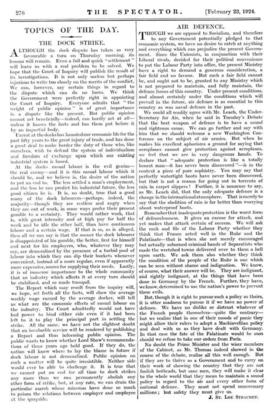AIR DEFENCE.
THOUGH we are opposed to Socialism, and therefore to any Government potentially pledged to that economic system, we have no desire to catch at anything and everything which can prejudice the present Govern- ment. Since the Unionists, in conjunction with their Liberal rivals, decided for their political convenience to put the Labour Party into office, the present Ministry be, and ought not to be, granted to any Ministry which is not prepared to maintain, and fully maintain, the defence forces of this country. Under present conditions, and almost certainly under the conditions which will prevail in the future, air defence is as essential to this country as was naval defence in the past.
We could all readily agree with Mr. Leach, the Under- Secretary for Air, when he said in Tuesday's Debate that the best weapon of defence is to have a sound and righteous cause. We can go further and say with him that we should welcome a new Washington Con- ference on the subject of air armies. But when he makes his excellent aphorisms a ground for saying that aeroplanes cannot give protection against aeroplanes, we feel that we are in very dangerous hands. To declare that " adequate protection is like a totally honest man—it has never been discovered "—is in the context a piece of pure sophistry. You may say that perfectly watertight boots have never been discovered, but that is not a reason for going out in torrents of rain in carpet slippers ! Further, it is nonsense to say, as Mr. Leach did, that the only adequate defence is a change in the international atmosphere. That is merely to say that the abolition of rain is far better than worrying about waterproof boots.
Rememberthat inadequate protection is the worst form of defencelessness. It gives an excuse for attack, and yet makes that attack certain of success. We will ask the rank and file of the Labour Party whether they think that France acted well in the Ruhr and the Palatinate—that is when she not merely encouraged but actually suborned criminal bands of Separatists who made the wretched towns delivered over to them a hell upon earth. We ask them also whether they think the condition of the people of the Ruhr is one which can be seen without shame and indignation. We know, of course, what their answer will be. They are indignant, and rightly indignant, at the things that have been done in Germany by the French. Further, they have, we know, determined to use the nation's power to prevent these evils.
But, though it is right to pursue such a policy as theirs, it is utter madness to pursue it if we have no power of defence. We have no dislike or distrust whatever of the French people themselves—quite the contrary— but we realize that in one of their moods of panic they might allow their rulers to adopt a Machiavellian policy and deal with us as they have dealt with Germany. In that case the fate of the Palatinate would be ours should we refuse to take our orders from Paris.
No doubt the Prime Minister and the wiser members of the Cabinet, as Mr. Thomas indeed showed in the course of the debate, realize all this well enough. But if they are to thrive as a Government and to carry on their work of showing the country that they are not foolish hotheads, but sane men, they will make it clear to the whole world that they mean to maintain a sound, policy in regard to the air and every other form of national defence. They must not spend unnecessary millions ; but safety they must give us.
J. ST. LOE STRACHEY.










































 Previous page
Previous page